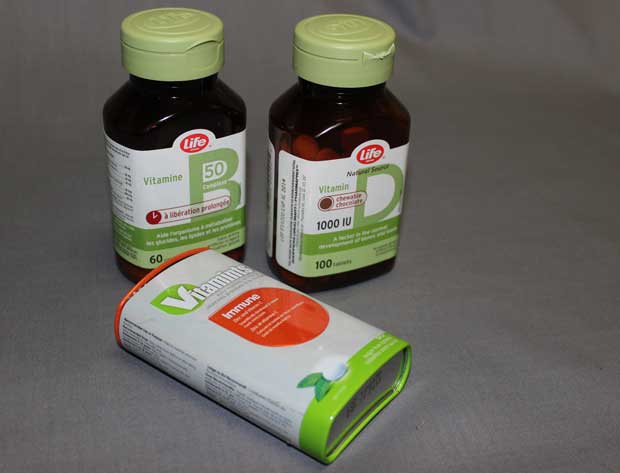
THUNDER BAY – Health News – Vitamin D can be a powerful supplement to help the body handle many ailments. One of the ways that our bodies get Vitamin D is through the sun’s exposure to our skin. That means, in Northern Ontario, in the winter our exposure is far more limited than during the summer. Some experts have suggested that the lack of Vitamin D in northern climates is a cause of seasonal depression.
There is also new research that says “Treating infection-prone patients over a 12-month period with high doses of vitamin D reduces their risk of developing respiratory tract infection – and consequently their antibiotic requirement”. This according to a new study by researchers at Karolinska Institutet and Karolinska University Hospital published in the online scientific journal BMJ Open.
“Our research can have important implications for patients with recurrent infections or a compromised immune defence, such as a lack of antibodies, and can also help to prevent the emerging resistance to antibiotics that come from overuse,” says Peter Bergman, researcher at Karolinska Institutet’s Department of Laboratory Medicine and doctor at Karolinska University Hospital’s Immunodeficiency Unit. “On the other hand, there doesn’t seem to be anything to support the idea that vitamin D would help otherwise healthy people with normal, temporary respiratory tract infections.”
Vitamin D is synthesised in the skin through exposure to sunlight and obtained through certain foods. In Sweden there is a seasonal variation in vitamin D in the blood, the trough coming during the darker half of the year. Studies have shown that low levels of vitamin D can increase the risk of infection, and it has long been known that the vitamin can also activate the immune defence.
For the present study now published in BMJ Open the researchers examined whether treatment with vitamin D can prevent and relieve respiratory tract infections in particularly infection-prone patients. All the 140 participants from the Immunodeficiency Unit had symptoms of disease in their respiratory tracts for at least 42 days prior to the study. The patients were randomly divided into two groups, one of which received vitamin D in relatively high doses, the other a placebo. They were also asked to keep a diary recording their state of health every day during the year-long study period.
The results show that symptoms of respiratory tract infection declined by almost a quarter and the use of antibiotics by almost half. Vitamin D treatment was also tolerated well by all patients and gave no serious side-effects.
The effect of vitamin D on respiratory tract infection is controversial, and a major study from New Zeeland published recently in the scientific journal JAMA found that it did not reduce the incidence or severity of viral respiratory tract infections. However, the present study differs from the JAMA study in several important respects, which could explain their different results. The JAMA study examined a group of healthy people with initially normal levels of vitamin D in the blood, and used bolus dose administration (i.e. large doses on fewer occasions), which is thought to be less effective that daily doses.
“However, the most important difference is probably due to the fact that our participants had much lower initial levels of vitamin D than those in the New Zealand study,” says Dr Anna-Carin Norlin, doctoral student and co-lead author of the study along with Dr Bergman. “There is evidence from previous studies that vitamin D supplements are only effective in patients who fall well below the recommended level, which also suggests that it would be wise to check the vitamin D levels of patients with recurrent infections.”
The amount of vitamin D you need depends on your age*.
|
Age group |
Aim for an intake of international units (IU)/day |
Stay below IU/day* |
|
Infants 0-6 months old |
400 |
1000 |
|
Infants 7-12 months old |
400 |
1500 |
|
Children 1-3 years old |
600 |
2500 |
|
Children 4-8 years old |
600 |
3000 |
|
Children and Adults 9-70 years old |
600 |
4000 |
|
Adults over 71 years old |
800 |
4000 |
|
Pregnant and Breastfeeding Women |
600 |
4000 |
|
*This includes vitamin D from both food and supplements |
||













